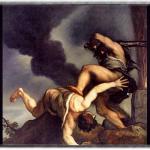
It’s been just over a week since the 500-year anniversary of the Protestant Reformation, which means it’s likely we’ll continue to come across thinkers who are developing their own ideas as to how the Christian church needs to reform (and no, not by simply adding a coffee shop in the foyer or something like that). Call me mimetic, but I would like to put forth my own thoughts on this matter. So, without further ado, here they are, in no particular order. (*Note: this is, admittedly, more theological than ecclesial, and is by no means an exhaustive list.)
- Christ Jesus, and not the Bible, shall be viewed as the Word—or, rather, the Logos—of God.
- The Bible, while indeed inspired, shall not be viewed as inerrant.
- If the Bible is to be called infallible, we shall make sure that what we mean is it is succeeds in conveying what its attempting to, and not that it’s incapable of making any errors, theological, historical, or otherwise.
- Phrases like “God said it, I believe it, and that settles it” or “the Bible clearly says” shall be removed from our vernacular. Indeed, there are very few things clear in the Bible.
- Biblical literalism shall not mean that everything in the Bible literally occurred, but that there are literal truths contained therein.
- The Bible shall not be used to inflict violence and coercion onto others.
- We shall acknowledge that we all have a hermeneutic and that all exegesis is indeed informed by our subjective experiences.
- It shall not, however, be enough to simply rely on our interpretation of the Bible; we shall, as John Wesley taught, incorporate tradition, reason, and experience.
- Theology that brings death to others—spiritual or physical—shall, at minimum, be questioned, if not outright abandoned.
- Theology that brings life to others—spiritual or physical—shall always be favored.
- The love of God shall be the lens through which our theology is formed.
- The love of God is, first and foremost, displayed at the Cross. Therefore, as Martin Luther taught, Christian theology begins here.
- The so-called wrath of God shall be interpreted through the lens that God is love, and not the other way around.
- God’s justice shall be interpreted through the lens that God is love, and not the other way around.
- God’s justice, therefore, shall be viewed as restorative rather than retributive, and shall not be juxtaposed against God’s love.
- The central message of Christians shall be centered on hope rather than punishment.
- We shall acknowledge that mercy always triumphs over sacrifice.
- Suffering of any kind—whether from disease, human violence, natural disasters, or otherwise—shall not be viewed as punishment from God.
- The book of Revelation shall be viewed in its original historical context and shall not, first and foremost, be a book about theology.
- The Gospel shall inform our interpretation of Revelation, and not the other way around.
- The Christian message shall not, first and foremost, be about going to heaven when we die; rather it shall be about bringing heaven to earth in the present.
- The 200-year old escapist doctrine of the Rapture shall be dismissed and abandoned.
- Atonement theology that posits Jesus took upon himself the wrath of God deserved by sinners shall be, at minimum, questioned if not outright abandoned.
- Atonement theology that emphasizes the self-giving nature of Christ and Christ’s victory over the devil, sin, and death shall be favored.
- Atonement shall not be limited to an elect few; rather, it shall be unlimited in its scope and power.
- Any attempts to revise the history of the Church—for good or for ill—shall not be attempted.
- The theory of apokatastasis (i.e., universal reconciliation), therefore, shall be accepted as a valid eschatological option for Christians.
- Regardless where one falls on the eschatological spectrum, acknowledgement that “indeed very many” Church Fathers affirmed universalism shall be made.
- Regarding the predominant eschatological doctrines—Eternal Torment, Conditional Immortality, and Universal Reconciliation—the Bible indeed can be interpreted to teach all three and we shall not deny that.
- It shall be acknowledged that the kingdom of God and the kingdom of empire are incompatible.
- Correct doctrine, whether heterodox or orthodox, shall not, first and foremost, be what defines Christ’s kingdom; rather, Christ’s kingdom shall be experienced through correct practice (i.e., orthopraxy).
- Political allegiances shall always be trumped by an allegiance to Christ, whom John calls the Lamb of God.
- As followers of the peaceful Lamb, we shall resist the temptation to use violence as a means to achieve a goal, whether religious, political, or otherwise.
- Regarding the violence the Church has committed in Christ’s name, we shall continue to repent, striving daily to become more peaceful.
- Regarding the LGBTQ+ community, we shall continue to repent and move toward full-inclusion into the Church at-large.
Now, I am certain some will not see eye-to-eye with me here. And others will have their own lists that go into much greater detail. That is splendid. The more voices we have in this discussion, the better. The Church needs as much input as possible. And since we are all a part of the body of Christ, we all have inherent value and should always feel free to speak out. We should always offer our opinions because (as interconnected as we all are) our direct experiences are our own and are, in a way, completely unique to us. That is the beauty of this human family we are all a part of.
If you have your own thoughts, please comment below. I’d be very interested in hearing how you would reform the Church, if you would even agree that the Church needs reforming.
Peace be with all of you.













